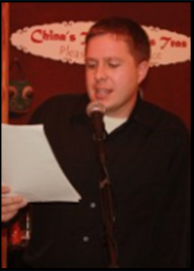The Dialogue of Our Demons
by Travis Switalski, Sr.
I woke up this morning with the greatest idea for a story that I’ve had yet. The characters and their plight rolled around in my head as I ascended the stairs to the living room. I dug around in my assault pack for the leather-bound notebook I use to write down my ideas and began building my outline. The thoughts and ideas flowed out easily, building up the excitement of starting a new project. Then, all of a sudden, it hit me. The story line was much like a story I’d read before and even seen on the big screen. It was just Fight Club without the underground fighting, so it’s okay to talk about.
It’s funny to think about. A good friend of mine and I had a good laugh about it over text message. My disappointment over the fact that I won’t be writing a literary masterpiece is even humorous in its own right. The incident got me thinking, though. It got me wondering about what triggers my creativity, what makes me feel compelled to write, and what brought me to come up with a plot that is based on the duality of human nature and the fragmentation of psyche. Most creative works are born of experience in some way, shape or form, so I suppose my idea was my inner “Tyler Durden” coming out.

I had a psych appointment this week, a reevaluation for my VA rating. I dread the psychologist’s office and have, by and large, avoided going since my untimely departure from the US Army. To me, talking about the things I have been through to a stranger is a significant emotional event. Speaking the words is much more difficult than writing them down. Somehow, talking about it out loud invokes that rottenness and evil in me to bubble to the surface like the Ouija Board calls spirits into your kitchen. Writing it out doesn’t make my experiences any less true, it just doesn’t bring out those deep dark feelings and memories that I keep buried way down in the recesses of my mind the way that talking does. Talking about it reminds me that there is another person sharing little pockets of my brain. It’s like having a split personality for a short time. Talking about it is like having a conversation with a guy you were cellmates with in prison. You no longer live together, but you’ll always be cellmates. You’ll always have shared horrors and memories. A part of you will always be in prison with him. Writing about him is like telling a fiction story, but talking about him makes it real. Writing is liberating to me. Talking about it feels like being in a prison.
That’s it though isn’t it? The trigger is the stress involved in having to express all of the horrible things I’ve seen and done to another human being. The stress of talking about it is what compels me to write it out. It’s a safer alternative. Thousands of people have read the articles I’ve written. A vast majority of them are strangers that I will most assuredly never meet in person, though a small fraction are people I know. Even fewer are individuals that I know well. One could argue that I habitually express myself and how I feel about my experiences through the articles that I write, and that it’s the same thing as talking about it. I agree with that to an extent. The difference is that I can say what I want on my own terms and in my own words without being asked a series of standardized questions designed to help someone analyze my problem. In writing and posting what I write, I am afforded the luxury of distance from those that read my words. It’s that distance from the reader that makes my method of dealing with the trauma of war effective for me.
Maybe I should write the story anyway. J.D. Salinger once said “I like to write. I live to write. But I write for myself and my own pleasure.” I should write it for nothing else but for my own sanity and to let go of the things that my cellmate subjected me to. The more I write, the less my time in the mental prison is painful, the less room my cellmate takes up, the better I feel. Maybe I should talk out loud about it more though? If that’s what gets the creativity flowing and gets all of this out of my head, then maybe I should subject myself to the talking aspect more often in order to get it out more effectively through writing.
Maybe the dialogue of my demons can exist in both places.







